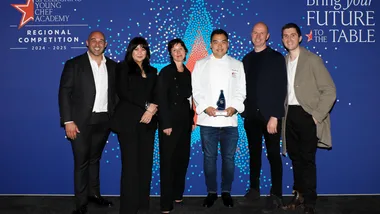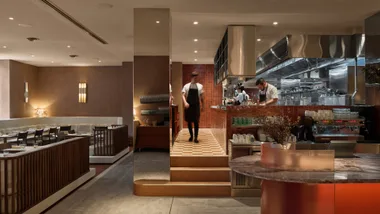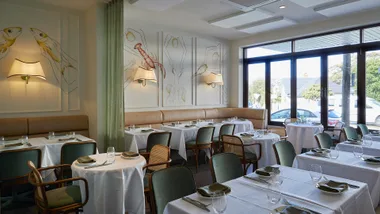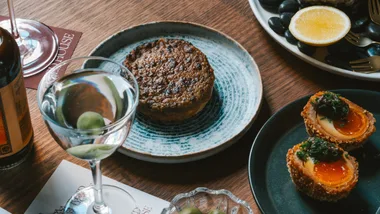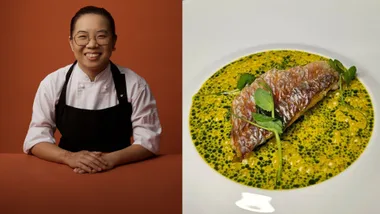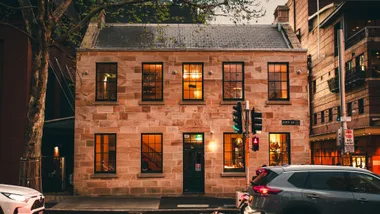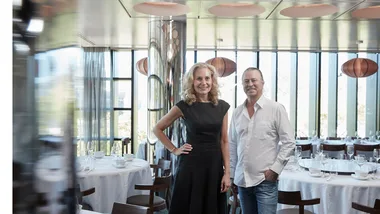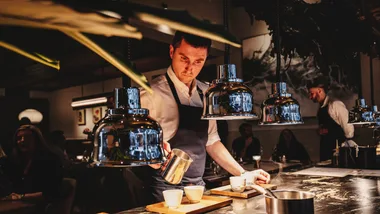More info
Visit stephaniealexander.com.au and kitchengardenfoundation.org.au
The Lorraine Lee rose has climbed beyond the trellis and the Gertrude Jekyll is rambling over the house, and although the carrots and silverbeet continue to flourish, Stephanie Alexander names the broad beans her star crop this month.
Sometimes I fear I’m repeating myself, but here’s a quick round-up of my spring garden. The Lorraine Lee rose has climbed way beyond her trellis and has new growth arching into the air. I love its bronze foliage, but regret that most of the gorgeous blooms are so high that I can’t pick any for my desk.
The front lawn can be mowed again now that the freesias have died down.
Each year I’m protective of my freesias. They’re the old-fashioned variety – cream or butter-yellow – and I ask that care be taken to allow them to bloom wherever they happen to be, which is always randomly in the front lawn and more predictably underneath the lemon tree.
I’ve had some outside painting done and the gorgeous Gertrude Jekyll had to be tied back to allow the painter access. She has been straining to be released and putting out new shoots, and now she can relax and resume her rambling over the front of the house.
The broad beans are the star crop this month. The tomatoes are still a few weeks away from being planted out. The old reliables – leek, carrot, silverbeet, sprouting broccoli, salad greens and herbs – keep on keeping on. And I’ve loved my smallish crop of spring peas.
Melbourne is renowned for its spring winds, and a very strong gust blew over my two-metre-tall cumquat tree in a very large and very heavy ceramic pot. It was amazing that the pot didn’t break. The only damage was that much of the soil fell out, as did a few of the flowering hyacinth bulbs. It was top-heavy and has now had a severe cutback. There’ll be no marmalade for a while.
The ornamental grapevine is spreading its huge leaves, offering a shady spot for lunch. Once again Colin Beer visited over a weekend, and he did a magnificent job hard-pruning the vine. It’ll completely cover the terrace this year.
In my role as founder of the Kitchen Garden Foundation I recently hosted a recruitment evening at Driver Primary School in Palmerston, a suburb of Darwin. There were 26 garden beds displaying a wide range of healthy plants: rows of tomatoes, beds of sweet potato, piles of pumpkins, vines hung with cucumbers and other gourds, rosella bushes and Ceylon spinach (sometimes called Malabar spinach) with clusters of tiny purple berries. The garden specialist told me that the berries are squashed and used to colour and flavour pasta – “Our substitute for squid-ink,” she said. The orchard offered pineapples, galangal, ginger, pawpaw, mango in flower, eight varieties of bananas and many other tropical fruits.
Last time I visited, the kitchen had been an empty space with electrical wires a-dangle. This time it was a most attractive welcoming space, and excited students handed around sweet-potato scones generously spread with their own rosella jam. The enthusiasm of the principal helped convince the representatives from other Top End schools and I’m pretty confident that we’ll soon have kitchen gardens at Jabiru, Jingili, Pine Creek and maybe Groote Eylandt. We’re also getting enquiries from remote indigenous communities. With more than 320 schools in the kitchen garden movement to date and a goal of 750 by the end of 2015, we’re well on the way to achieving my aim of having 10 per cent of Australian primary schools involved in the scheme.
Funding is always an issue for any not-for-profit foundation. Every two years supporter and board member Paul Bangay – one of Australia’s best-known garden designers – opens his beautiful property Stonefields in Denver, near Daylesford, with all proceeds going to the Kitchen Garden Foundation. Garden-lovers should put the 23 and 24 November in their diaries (for more information and tickets, visit kitchengardenfoundation.org.au). Paul’s gardens are exquisite. I recall the display of unusual alliums two years ago, and the apple tree avenue, and the deep-red Shakespeare rose. I bought one, though sadly it hasn’t performed as it did in one of the walled gardens at Stonefields. An added attraction will be scones made by my friend Annie Smithers. Annie rises at 4am to make these so that they are fresh.
I’ll have some exciting developments to announce next month. Until then.
 Armelle Habib
Armelle Habib
